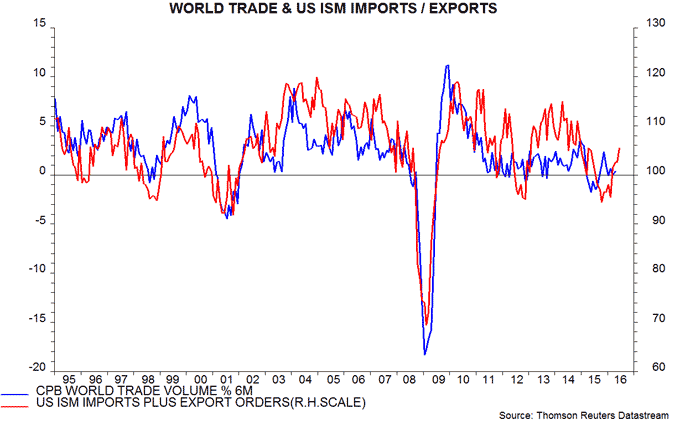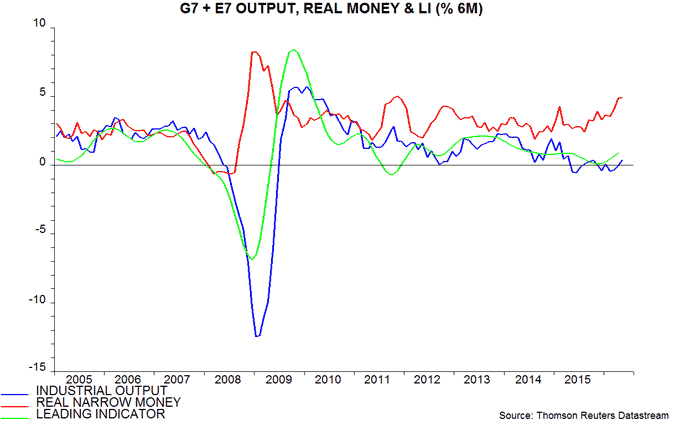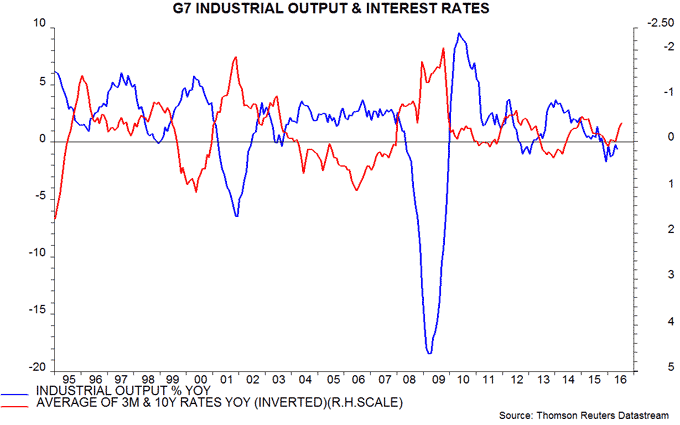Global growth: stay positive unless money trends reverse
Global economic growth appeared to be picking up at mid-year, as had been suggested by a rise in real narrow money expansion in late 2015. The view here is that the Brexit vote shock may delay but is unlikely to derail a further improvement in economic momentum during the second half. This view will be reassessed if narrow money trends weaken, which is not expected.
The suggestion of a mid-year pick-up is supported by industrial output data and business surveys. The six-month change in global (i.e. G7 plus emerging E7) industrial output appears to have risen to a seven-month high in May, based on available data. Manufacturing purchasing managers’ surveys for June reported increases in new orders indices in the US, Japan, Eurozone and UK. The sum of the import and export orders indices in the US ISM survey rose to a 14-month high, consistent with a recovery in global trade volumes – see first chart.
A pick-up had been signalled by a rise in global six-month real narrow money expansion in late 2015, with this signal confirmed in early 2016 by an upturn in a non-monetary leading indicator based on OECD country leading indicator data. Real money growth continued to rise during the first half, reaching its highest level since 2011 in May, suggesting strong second-half economic prospects – second chart.
As previously discussed, the global implications of expected post-Brexit-vote UK economic weakness are minor, even for the rest of Europe – the UK accounts for 2% of the IMF’s world GDP measure, while exports to the UK represent 3% of the GDP of the rest of the European Union. The concern is that the shock may trigger other negative developments resulting in a sustained “risk-off” move in markets that feeds back into weaker demand globally.
The market response to date has been reassuring, with “safe” government bond yields down sharply but equity market indices and credit spreads broadly stable – expectations of easier monetary policy, in other words, have prevented an investor shift towards economic pessimism.
The fall in yields, unless reversed, is likely to be reflected in further reductions in bank deposit and lending rates, suggesting that monetary trends are more likely to strengthen than weaken as a result of the shock.
The annual change in an average of G7 short-term rates and 10-year government yields is an inverse long leading indicator of economic growth. The current average is 40 basis points lower than a year ago, representing a significant turnaround from a small annual rise in December / January – third chart.
A possible analogy is the aftermath of the 1987 stock market crash, which damaged business confidence and led many economists to predict a recession. It occurred, however, against a backdrop of an improving economy and a post-crash drop in interest rates provided further stimulus, resulting in stronger-than-expected growth in 1988.
Global business surveys for July are quite likely to show a knee-jerk negative response to the Brexit vote shock. The focus here, instead, will be on whether recent strong narrow money trends start to reverse. An initial assessment will be possible in late August following release of July monetary data for the major economies.

Reader Comments